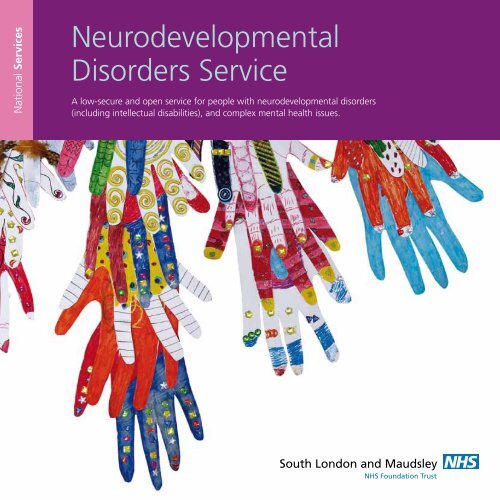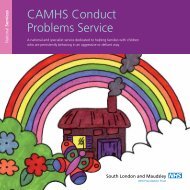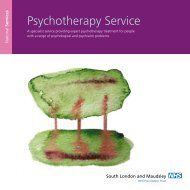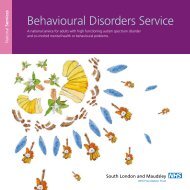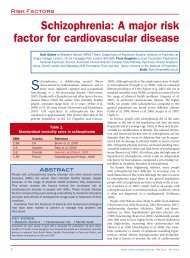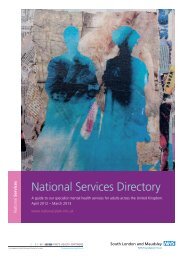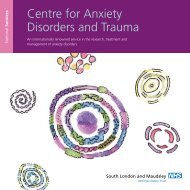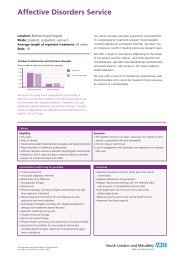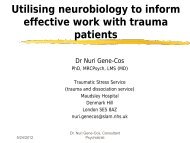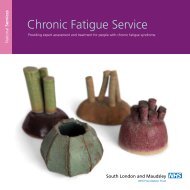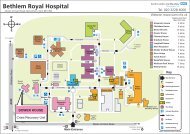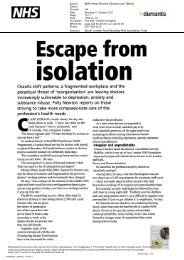Neurodevelopmental Service booklet - SLaM National Services
Neurodevelopmental Service booklet - SLaM National Services
Neurodevelopmental Service booklet - SLaM National Services
Create successful ePaper yourself
Turn your PDF publications into a flip-book with our unique Google optimized e-Paper software.
<strong>National</strong> <strong>Service</strong>s<strong>Neurodevelopmental</strong>Disorders <strong>Service</strong>A low-secure and open service for people with neurodevelopmental disorders(including intellectual disabilities), and complex mental health issues.brand design and graphic design by www.piersanddominic.com london bristol bath
» For me, it was such a relief she had the chance to go to thereand get a proper diagnosis and treatment. She was in prisonwhen she was referred so that made it a double relief really.I’m 74 now so I was very grateful for the chance she had.Now we’re just taking things as they come. « Mary, carerCover artwork provided by the CREATEAM creative art group at the <strong>Neurodevelopmental</strong> Disorders <strong>Service</strong>.2
<strong>National</strong> <strong>Service</strong>s: <strong>Neurodevelopmental</strong> Disorders <strong>Service</strong>Contents<strong>Service</strong> overview 4Our philosophy 5Who is our service for? 6Interventions 8Our care pathway15Outcomes 16Research 18Our facilities 19Training and consultancy 20Our team 22Case studies 26Referring to our service 30brand design and graphic design by www.piersanddominic.com london bristol bath3
South London and Maudsley NHS Foundation Trust<strong>Service</strong> overviewWe offer an open and low-secure service for people with borderline to severe intellectualdisabilities and additional complex mental health needs.Our strengths include high quality care, agreed lengths of stay,regular outcome reporting, clear pathways and goal setting,and close liaison with commissioners and clinicans. Ourneurodevelopmental inpatient pathway provides services foradults with neurodevelopmental disorders, including:brand design and graphic design by www.piersanddominic.com london bristol bath››Intellectual disabilities and co-morbid mental illness››Autism spectrum conditions (with or without intellectualdisabilities) and significant risk behaviours››High functioning autism and co-morbid mental illness››Complex attention deficit hyperactivity disorder (ADHD)››All of the above presenting with forensic behavioursKing’s Health PartnersOur service is part of the Behavioural and DevelopmentalPsychiatry Clinical Academic Group. <strong>SLaM</strong> has joined with King’sCollege London, Guy’s and St Thomas’ NHS Foundation Trust,and King’s College NHS Foundation Trust to establish King’sHealth Partners, an Academic Health Sciences Centre. King’sHealth Partners brings clinical care, research and educationmuch more closely together. We aim to reduce the time it takesfor research discoveries and medical breakthroughs to becomeroutine clinical practice. This will lead to better care andtreatment for those who use our services.Visit www.kingshealthpartners.org for more information.4
<strong>National</strong> <strong>Service</strong>s: <strong>Neurodevelopmental</strong> Disorders <strong>Service</strong>Our philosophyWe believe that the people who use our service have the right to keep their dignity, while improvingtheir independence, physical health and mental well-being.People who are treated by our service have a right to privacy,choice and autonomy, where these do not exceed theconstraints imposed by wider society. Our duty is to providethe best physical, social and therapeutic environment tofurther our patients’ legitimate aims.We believe that our duty is to deliver:››Excellence in all aspects of care››A holistic, recovery-oriented approach where we work witha person to achieve their aims››A social environment that promotes a positive self-image,self-awareness, self-reliance and respect for others››A wide range of stimulating and motivating therapeuticand occupational opportunities, both in the hospital andin the community››Support and education for carers››Support for referrers and commissioners» She had a lot of sessions with thepsychologist, group meetings and sportssessions. She chose to take part in somethings and not others. And there wasoccupational therapy, which was good...especially the cooking. « Mary, carerbrand design and graphic design by www.piersanddominic.com london bristol bath5
South London and Maudsley NHS Foundation TrustWho is our service for?Our service is for people with borderline to severe intellectual disabilities, requiring either a lowsecureor open ward environment. They may have a co-morbid mental health disorder, thoughthis might not be apparent prior to referral. People who are referred to our service may alsohave a history of challenging or forensic behaviour.brand design and graphic design by www.piersanddominic.com london bristol bathEligibility››18+ years››Male or female››Borderline to severe intellectual disability››Complex social and psychiatric needs that cannot bemet by local services››Diagnostic complexity››Informal or subject to detention under the MentalHealth Act (civil or forensic sections)››Autism spectrum disorder (ASD), attention deficithyperactivity disorder (ADHD), mental illness orpersonality disorder››Complex mental disorder, possibly associated withchallenging behaviour or a forensic history››Acute mental health problems that will benefit frombrief treatmentExclusion››Profound intellectual disability››People requiring a medium or high security setting» I was so happy that they were interested inwhat was wrong with him – that there wasa team of professionals who would take thetime to look at him and help.« Margaret, carer6
<strong>National</strong> <strong>Service</strong>s: <strong>Neurodevelopmental</strong> Disorders <strong>Service</strong>brand design and graphic design by www.piersanddominic.com london bristol bath7
South London and Maudsley NHS Foundation TrustInterventionsInterventions are evidence-based and designed to address a range of mental health problemsand improve our patients’ quality of life.brand design and graphic design by www.piersanddominic.com london bristol bathOur interventions include:››Clarification of diagnosis using standardised tools,including experimental withdrawal of medication››Neuropsychological assessment››Applied behavioural analysis››Optimising physical health››Risk assessment››Pharmacological treatment››CBT››Occupational therapy››Group therapy››Social work support››Learning from a pro-social environment››Art psychotherapy››Family therapy››Needs assessment and discharge planningAssessmentTo support a person with an intellectual disability it is vital toidentify each contributor to his or her difficulties, so the righttreatment opportunities are made available. This is particularlyimportant when a person behaves in a way that limits theirsocial function or prevents community living.A person with an intellectual disability may find it moredifficult to get the help they need or manage their feelingsand this can lead to inappropriate behaviour. Our staff areworld leaders in the assessment of mental health disordersand challenging behaviour in the context of intellectualdisabilities. The best available diagnostic techniques, includingqualitative and quantitative psychiatric examinations,behavioural assessment, systemic analysis, imaging andgenetics are used to identify a person’s problems.8
<strong>National</strong> <strong>Service</strong>s: <strong>Neurodevelopmental</strong> Disorders <strong>Service</strong>» She’d also made some good relationships with staff and other patients. « Mary, carerWe provide a detailed assessment and person-centredunderstanding of social, cognitive, emotional and psychiatricneeds. We then work with each person to understand whythey have experienced difficulties and to help them developand achieve greater independence.Neuropsychological assessmentNeuropsychological assessment involves the use ofpsychological tests, including tests of general intellectualfunction, memory and visuospatial abilities. Assessment ofplanning and organisational abilities is particularly important.Functional behavioural assessmentBehavioural assessments form an important part of ourunderstanding of a person’s difficulties and may inform aspecific treatment.In applied behavioural analysis, we analyse the circumstancesthat lead to and maintain a challenging behaviour. This oftenleads to specific behavioural treatments that can be used toimprove social functioning.Qualitative information from occupational, psychological andeducational interventions will contribute to a behaviouralformulation. This can be used to develop strategies to modify aperson’s behaviour.Cognitive behavioural therapyWe use adapted versions of CBT to suit the cognitive abilitiesof our patients. Our approach focuses on helping the personto discover for themselves the links between their thoughts,feelings and behaviours. Longer term treatment can address aperson’s core beliefs and help them to develop a more positiveview of themselves and the world around them. We also offercognitive remediation therapy and mentalization-based therapy.Occupational therapyEach person is assessed by an occupational therapist whoreviews their level of performance in vocational, leisure,communication and interaction skills. We then work with thepatient to develop a graded skills improvement plan.brand design and graphic design by www.piersanddominic.com london bristol bath9
South London and Maudsley NHS Foundation TrustInterventions continuedbrand design and graphic design by www.piersanddominic.com london bristol bathSocial inclusionWe offer an environment where all patients’ rights toexpression, choice and autonomy are respected by everyone.We support people in understanding that meeting everyone’sneeds involves placing limits on their own behaviour andnegotiating with others. This leads to the recovery ofimportant social functions and prepares people for success incommunity living. Our nursing team promotes environmentalsafety and offers one-to-one support, often involving helpingto understand other people’s points of view, and negotiatingwith others.From as early as possible in their admission people areencouraged to access local community facilities to helpdevelop and maintain their independence. These include localgyms, libraries, adult education, voluntary work, shops, cafésand work placements. Many of our patients participate inother activities that improve overall well-being like visitingplaces of particular interest, using a mixing-desk, music andriding lessons.When independent community access is not possible, weaccompany the person to activities. We use the principles ofpositive risk-taking to move as rapidly as possible tounaccompanied access to local community facilities.Group treatmentsBeing in a group is central to learning to understand anotherperson’s point of view. It leads to confidence in self-expression,decreases social anxiety and normalises the learningexperience. People are encouraged to attend a wide variety ofgroups including community groups, where they shareexperiences and learn adaptive skills, sex education groups,social skills groups, current affairs groups, gender-specificgroups and a daily patient-led group.Promotion of physical healthWe aim for people to achieve a healthy mind in a healthybody. We help patients access primary and secondary careservices and offer smoking cessation and dietary advice,exercise instruction and support with sleep hygiene as part ofour commitment to a person’s physical well-being.Art psychotherapyArt psychotherapy offers people a means of self-expressionthat helps them realise their potential by making sense of theirexperiences and developing insight and emotional intelligence.10
<strong>National</strong> <strong>Service</strong>s: <strong>Neurodevelopmental</strong> Disorders <strong>Service</strong>Family therapy and supportWe understand that it is a worrying time when a familymember is experiencing psychological or behaviouraldifficulties, or when they are admitted to a unit that may befar from home. When someone is admitted we hold a meetingwith family and carers to arrange support which we offerthrough regular phone calls, meetings with team members orin family therapy. We run a monthly carer support group toprovide an opportunity for people to access information anddiscuss the experiences and challenges they face.Social workWe provide advocacy for all patients, as well as access tosolicitors and mental health review tribunals. We provideguidance on matters relating to best interests, welfarebenefits, safeguarding, the criminal justice system, theMental Capacity Act, the deprivation of liberty safeguardsand the care programme approach. Our social worker isinvolved in the multidisciplinary assessment and managementof risk as well as in the liaison with referrers, communityteams and other agencies.Needs assessment and discharge planningWe use a range of tools to assess people’s individual needs.Needs assessments are regularly reviewed with the patient tomeasure progress and plan the next steps in treatment. Thisoften improves patients’ self-esteem as they see their progressand acquire new skills.We hold regular care programme approach meetings that arefocused on recovery and decision-making with the patient,their advocates and home teams. As soon as the patient’slonger term needs can be identified, we prepare a placementprofile and after-care plan with the patient and local services.Our approach maximises the person’s autonomy and minimisesthe risk of placement breakdown.Risk assessmentWe use structured assessment tools, including the HCR 20 andPCL-R to assess a person’s vulnerability and possible risk tothemselves or others. We identify the support each personneeds and monitor their environment, their behaviour andassist them with coping strategies for dealing with unexpectedevents. This enables our patients to access the least restrictiveoptions available and maximise their independence.Pharmacological treatmentSometimes pharmacological treatment is necessary to treat aperson’s mental illness. When drug treatment is required, wesupport our patients to understand the options available andhelp them to choose the treatment that is best for them. Wehold regular medication education groups and continuallymonitor medication use and effects.brand design and graphic design by www.piersanddominic.com london bristol bath11
South London and Maudsley NHS Foundation TrustWeekly programmeTime MONDAY TUESDAY WEDNESDAY THURSDAY FRIDAY SATURDAY SUNDAY08.00 – 09.00 BreakfastgroupBreakfastgroupBreakfastgroupBreakfastgroupBreakfastgroupBreakfastgroupBreakfastgroupbrand design and graphic design by www.piersanddominic.com london bristol bath09.30 – 10.00 Communitymeeting10.00 – 12.00 Communitycentre10.00 – 11.00CommunitymeetingSwimming10.30 – 11.30IndividualOT Session10.00 – 12.00CommunitymeetingWalking group10.15 – 11.15CommunitymeetingFeelings group10.00 – 11.00CommunitymeetingCycling10.30 – 11.30Cooking11.30 – 13.00Male andfemale groupand individualoccupationaltherapysessions9.30 – 12.0012.00 – 13.00 Lunch Lunch Lunch Lunch Lunch Lunch Lunch13.00 – 18.00 Ward round14.15 – 17.00Open artgroup18.15 – 19.15Individualpsychology13.00 – 13.30Social skillsgroup15.30 – 16.30Group painting13.00 – 15.00Being onthe ward16.00 – 16.45Computing15.00 – 16.0018.00 – 19.00 Dinner Dinner Dinner Dinner Dinner19.00 – 21.00 Art group Film night Social night IndividualpsychologysessionsNumeracy14.00 – 14.45Sports group13.00 – 18.00Churchcoffee andnewspapergroup9.30 – 12.00Cooking group13.00 – 18.00» I always felt it was a shame she didn’t want to do art therapy, but she really enjoyedthe occupational therapy sessions and learnt quite a bit. One thing she also reallyloved to do was go to the chapel and sing. « Mary, carer12
<strong>National</strong> <strong>Service</strong>s: <strong>Neurodevelopmental</strong> Disorders <strong>Service</strong>brand design and graphic design by www.piersanddominic.com london bristol bath13
South London and Maudsley NHS Foundation TrustOur care modelASSESSMENT››Mental disorder, includingdevelopmental disabilities, mentalillness and personality disorder››Behavioural disorder, includingoffending behaviour››Neuropsychological functioning››Physical health, including for genetic,metabolic and neurological conditions››Social inclusion and daily living skills››Communication abilities and needs››Multidisciplinary formulationsFAMILIES AND CARERS››Education about mental health difficulties››Support in interactions with patients››Family therapy››Carers’ group with lectures and learningthrough shared experienceEducation, vocationalopportunities››On-ward, within hospital,community education››Work-readiness training››Support with voluntary workduring admission››Support to move topaid employment››Liaison with charitable sectorbrand design and graphic design by www.piersanddominic.com london bristol bathRisk management››Comprehensive risk assessment››Positive risk-taking››Low-secure environment››Step-down from medium secureunits or prison››Relational security››Identification of futuresupport needs››Graded discharge››Support for community services››Appropriate use of MHA, MCAand DOLS legislationPATIENT››Freedom fromdistressing symptoms››Improved physical health,personal function and self esteem››Increased independence andinvolvement in decision making››Improved social inclusion andsocial skills››Contact with loved ones››Decreased offending behaviour››Fulfilled spiritual needsDISCHARGE PLANNING››Liaison with the tertiary panel,carecoordinatorand referring agencies››Early identification of future support needs››Comprehensive placement profile››Independent living where possible››Support for commissioner in locationof placementTHERAPIES››Pharmacological treatment››Cognitive andbehavioural therapies››Modelling in a pro-social milieu››Cognitive remediation therapy››Occupational therapy andsocial inclusion››Life story work››Psychoeducation››Relapse prevention››Art psychotherapy››Mindfulness group››Sex education››Sensory integrationand mentalization14
<strong>National</strong> <strong>Service</strong>s: <strong>Neurodevelopmental</strong> Disorders <strong>Service</strong>Our care pathwayReferral received, review referralDiscuss free assessment with PCT, toagree possible cost implicationsFree assessment at the person’s locationSuitable for treatment, consider legal statusPatient admitted, with monthly clinicalupdate reports and review of legal statusWeeks 10-12: CPA review with PCTsLength of stay agreed treatment phaseTreatment: non-forensic (3-6 months),forensic (9-12 months)CPA dischargeplanning meetingNot suitableNot suitable for treatmentFunding request for authorisationfor 12 week assessment phaseWeek 10: assessment report withrecommendations and placement profileprovided to PCT and referrerDischargeMonthly clinical update reportsand exit strategy reviewDischarged to referrer usingplanned placement profile andtreatment recommendationsbrand design and graphic design by www.piersanddominic.com london bristol bath15
South London and Maudsley NHS Foundation TrustOutcomesWe aim to help people understand their difficulties, decrease their symptoms, improve theirsocial abilities and gain control over their lives. This means that we tailor our outcomes to therequirements of each person.brand design and graphic design by www.piersanddominic.com london bristol bathOutcomes may include:››Identification of intellectual disability and level of functioning››Treatment for co-morbid disorders››Decreased challenging and forensic behaviour››Decreased risk to self and others››Decreased vulnerability››Optimum functioning and improved quality of life››Future care needs identified in a placement profile››Discharge planning with the referrer››Person placed in a less restrictive environment››Staff training and ongoing support via our outreach service››Working relationships between local services, nationalservices and families or carersGraph 1 shows that attendance at sessions over a 10 monthperiod on the unit is positively linked with a reduction inviolent incidents on the ward. All people have the opportunityto come to the groups. They are well attended and evaluatedfor their effectiveness.Graph 2 shows improvement in the HoNOS LD and securescores for patients on admission and following 12 months oftreatment with our service.16
<strong>National</strong> <strong>Service</strong>s: <strong>Neurodevelopmental</strong> Disorders <strong>Service</strong>» They’ve quickly got him into a routine and his social skills are really quite good now,whereas I wouldn’t have got anything out of him two years ago. « Margaret, carerHoNOS SCORES251. Incidents and sessions attended for all patientsin the unit over a 10 month period2. HoNOS scores on admission and after12 months’ treatment20SESSIONS30HoNOS SCORES251525201020155151050O N D J F M A M J JTotal sessions (units of 10)Total incidentsA M J J1050HoNOS LD0HoNOS LDHoNOS SECUREFirst monthFollowing 12 monthsbrand design and graphic design by www.piersanddominic.com london bristol bath17
South London and Maudsley NHS Foundation TrustResearchOur service works closely with the Institute of Psychiatry, King’s College London. Our researchfocuses on developing and improving our assessment and treatment methods.Our ongoing research topics include:brand design and graphic design by www.piersanddominic.com london bristol bath››Pioneering applications of neuroimaging and genetics››Understanding the relationship between genes, the brain,cognition, social environment and behaviour in normal andabnormal development››Community-based research focusing on interpretations ofillness, misfortune and distress in terms of religious beliefsand practices››Psychological treatments for neurodevelopmental disorders» I found she was so much easier todeal with. And, considering the wayshe was brought into the Bethlem,she was now being allowed into thegrounds on her own. « Mary, carer18
<strong>National</strong> <strong>Service</strong>s: <strong>Neurodevelopmental</strong> Disorders <strong>Service</strong>Our facilitiesOur inpatient unit has 26 beds and is located on the grounds of the historic Bethlem Royal Hospital.Our unit has recently undergone a major refurbishment, makingit an ideal facility for recovery. It combines both low secure andopen environments, enabling patients to move more freelydepending on their changing needs.Bethlem Royal Hospital has a long history of providing thehighest quality care for people recovering from mental healthissues. The hospital offers the perfect therapeutic environmentfor promoting recovery, set in 270 acres of green space, withwoodland and meadows that are designated as a ‘site ofimportance for nature conservation’.Facilities at the Bethlem include a swimming pool, art gallery,walled garden, a chapel, nature walks and an extensiveoccupational therapy programme, utilised by many of ourpatients. This programme provides a wide choice of creativeactivities, which gives people the opportunity to rekindle oldskills, learn from new experiences and build their confidenceon their path to recovery.We offer:››Separate living areas for male and female patients››Private bedrooms with ensuite››Therapy rooms››Quiet rooms››Laundry and linen rooms on either side of the ward››Art and recreation rooms››Library and IT rooms››Kitchen››Secure gardenbrand design and graphic design by www.piersanddominic.com london bristol bath19
South London and Maudsley NHS Foundation TrustTraining and consultancyClinicians in our team are widely involved in undergraduate and postgraduate medicalteaching, as well as teaching on MSc courses at the Institute of Psychiatry, King’s CollegeLondon, including mental health in intellectual disabilities, forensic mental health researchand mental health sciences. Our clinicians also supervise MSc and PhD students.We would be happy to discuss training and consultancywith mental health professionals. For more informationplease email ndsreferrals@slam.nhs.ukbrand design and graphic design by www.piersanddominic.com london bristol bathEstia CentreAn integral part of our work is our relationship with the EstiaCentre, a training, research and development resource forthose who support adults with intellectual disabilities andadditional mental health needs. The Estia Centre is an integralpart of our services for people with intellectual disabilitiesprovided by the Trust.The Estia Centre supports the development of a competentworkforce, from support staff to experienced managers andfrom a variety of services. By working in close collaborationwith clinical services, we aim to improve the care of peoplewith intellectual disabilities, especially those with additionalmental health needs, through evidence-based practice. Todiscuss our training packages further, please contactSteven Hardy on steve.hardy@kcl.ac.ukFor more information visit: www.estiacentre.org20
<strong>National</strong> <strong>Service</strong>s: <strong>Neurodevelopmental</strong> Disorders <strong>Service</strong>brand design and graphic design by www.piersanddominic.com london bristol bath21
South London and Maudsley NHS Foundation TrustOur teamOur team draws on expertise from a wide range of disciplines including nursing, psychiatry,occupational therapy, psychology, art psychotherapy, social work, pharmacy and administration.Dr Dene Robertson MRCGP, MRCPsychLead Clinician | Consultant PsychiatristDr Robertson is a consultant psychiatrist and lead clinician for theTrust’s developmental disorders services. He also works in theAdult ADHD <strong>Service</strong> and the Autism Assessment and BehaviouralGenetics Clinic.brand design and graphic design by www.piersanddominic.com london bristol bathHe is the clinical lead in our service.Other rolesDr Robertson is a frequent speaker at engagements andconferences, specifically covering developmental disorders,forensic learning and disability psychiatry.BackgroundDr Robertson’s undergraduate training was completed atSt Mary’s Hospital Medical School. His postgraduate trainingwas completed at Hammersmith Hospital (GP training scheme).He worked at St George’s Hospital in Tooting, London,before becoming a clinical lecturer at the Institute ofPsychiatry, King’s College London. He took his consultantpost in the Trust in 1999.ResearchHis main research interests include developmental forensicpsychiatry, the neurobiology of developmental disordersincluding chromosomal, single gene and polygenic disorders,as well as sex steroids and brain development.22
<strong>National</strong> <strong>Service</strong>s: <strong>Neurodevelopmental</strong> Disorders <strong>Service</strong>Dr Shaun Michael Gravestock MBBS, FRCPsychConsultant PsychiatristDr Shaun Michael Gravestock is a consultant psychiatristwho specialises in the mental health of intellectual disabilities.He is also an editorial board member of the Advances inMental Health and Intellectual Disabilities journal.Dr Gravestock is a member of the Royal College ofPsychiatrist’s learning disability faculty and executive andproject lead for the family carer strategy working group.ResearchDr Gravestock is a co-author of the Diagnostic Criteria forLearning Disabilities (DC-LD 2001), published by the RoyalCollege of Psychiatrists. He is also responsible for writingdiagnostic criteria for eating disorders, personality disordersand problem behaviours.brand design and graphic design by www.piersanddominic.com london bristol bath
South London and Maudsley NHS Foundation TrustOur team continuedDr Kiriakos Xenitidis MSc, MD, MRCPsychConsultant Psychiatrist | Visiting Senior LecturerDr Kiriakos Xenitidis is a consultant psychiatrist at our unit andalso works with the Trust’s Adult Attention Deficit HyperactivityDisorder <strong>Service</strong>.brand design and graphic design by www.piersanddominic.com london bristol bathHe is a visiting senior lecturer at the Institute of Psychiatry,King’s College London.Other rolesHe is a member of the General Medical Council, the RoyalCollege of Psychiatrists, the Association of Family Therapy UK,the British Association of Sexual and Marital Therapists andthe Institute of Group Analysis.BackgroundDr Xenitidis sat his medical degree, ‘Ptychio Iatrikes’, at theUniversity of Athens’ Medical School in 1984. Moving to theUK, he became a member of the Royal College of Psychiatristsin 1993 and went on to complete a masters degree at StGeorge’s Medical School, University of London, in 1996.In 1998, he finished a certificate of completion of specialisttraining with the General Medical Council and completed adoctor of medicine degree at the University of London in 2003.ResearchHis current research interests include ADHD, the forensicaspects of intellectual disabilities and health services research.24
<strong>National</strong> <strong>Service</strong>s: <strong>Neurodevelopmental</strong> Disorders <strong>Service</strong>Lynette KennedyClinical <strong>Service</strong>s ManagerLynette Kennedy is the Clinical <strong>Service</strong>s Manager for the<strong>Neurodevelopmental</strong> Disorders <strong>Service</strong>. She is responsible for theeffective daily running of the service, including the operationalmanagement of team leaders and professional heads.BackgroundLynette studied at Stoke Mandeville Hospital in Buckinghamshireand became qualified as a registered nurse for people withlearning disabilities in 1996. She then moved to Leeds to workin a low secure mental health facility, before starting work forthe Trust in 1997. Lynette first worked for the MentalImpairment Evaluation and Treatment <strong>Service</strong>, before shemoved to the Mental Health of Learning Disabilities Unit. Afterfive years, Lynette became the team manager, before beingappointed to her current position of service line manager.Other roleLynette was part of the Royal College of Nursing’s mentalhealth nursing of adults with learning disabilities guidesteering group. She co-authored the Improving servicesthrough partnership and consultation: a case example article,published in Advances in Mental Health and IntellectualDisabilities, March 2011 and presented at the 5th and 7thEuropean Congress of Mental Health in Intellectual Disabilityconferences in Barcelona (2007) and Amsterdam (2009).brand design and graphic design by www.piersanddominic.com london bristol bath25
South London and Maudsley NHS Foundation TrustSandrabrand design and graphic design by www.piersanddominic.com london bristol bath“ My brother has autism and learningdifficulties.”There was a breakdown in residential care. He’d beenliving somewhere for 18 years and had to be movedto a private clinic in Waterloo, which then closed down,so they were frantic to find him somewhere else.To be honest, I was concerned when they suggested theBethlem. I wasn’t sure it was the right placement for himbecause I only knew it as a mental hospital. What learningdifficulties support did they have? I was worried he wasbeing sent to the Bethlem just because they didn’t knowwhat else to do. But, they told us that this was a specialistunit for learning difficulties and assured us he would beokay, so he moved there in May.“ They have built a good rapport with him.”It can be difficult to get a sense of his inner world,because although he has some language skills, he can’treally process and express his feelings. I do think he felta bit frightened about the move – and sad initially –autistic people like structure and this was a big change.He got on with it though.The staff are definitely fond of him. And, althoughhe doesn’t have the ability to connect with the otherresidents, they seem to be quite protective towards him.He has the lowest ability on the ward when it comesto looking after himself physically, so he could bevulnerable, but he hasn’t been, and the others havelooked after him.My mum, my dad and myself like to visit him twoor three times a week, and what I really liked was thatwe were included in things from the very beginning– with all his processes and much of his care. He doesn’tlike people taking his blood, for instance, so they askedme to come in to be with him.“ The staff have been really supportiveand respectful.”They are really caring and it’s been a really transparentprocess. We have always been made aware of anywobbles and, in these cases, the team has consideredthe triggers, looked at what they can perhaps do betterfor him and what we, as his family, can also do to help.He challenged the medication a bit at the start, but theywere able to get support from the old placement.We’ve always been invited to his care programmeapproach meetings and feel we have a voice. Thoughthere are a variety of professionals in these meetings,our opinion seems to carry an equal weight and oursuggestions are taken on board. As a family takingpart in these kinds of processes, you sometimes wonderwhether you’re heard, but they seem to think we havea lot to contribute, which is nice. It’s been a reallyempowering process.“ They’ve helped us to understand hisautism better.”We may have lived with him for his whole life, butthe team has helped us to understand his autism better.They’ve been wonderful.26
<strong>National</strong> <strong>Service</strong>s: <strong>Neurodevelopmental</strong> Disorders <strong>Service</strong>His autism diagnosis has always felt a bit vague actuallyand one thing they’ve done is explain to us more clearlywhat his condition looks like day-to-day, and how itrelates to his learning disability. He can sometimesstand too close to people and they have helped usunpack behaviour like that – to realise that he doesn’treally have the usual awareness of space and social rules.The staff have a lot of empathy too. At one stage,he didn’t look well when he started on new medicationand we told them how worried we were. They tookthe time to tell us what was happening and explainedthat the side-effects would wear off. We’ve always feltcomfortable to ask and they have always given clearexplanations. We could even go home, do our ownresearch and come back to them with questions ifwe wanted.“ They’ve helped us through the dauntingprocesses too.”He had a tribunal as part of the sectioning processand that felt a little daunting because of the crossexaminationand panel. But the staff explained whatwas going to happen and it felt like we were respectedat every stage. He had a solicitor in the tribunal andshe was also very good.I think they admire the support we give him actually.I feel we’ve been held in high regard in a way. They seemhappy he has somebody – that his family is behind him.So, this has been eye-opening for me because, like I said,I started from a place where I wasn’t sure if the Bethlemwould be right for him. I wanted to get him in and outas quickly as possible, but the team hasn’t rushed theprocess, which is really good. They have wantedto be thorough so he won’t need to be re-admitted.“ The team has invested a lot of timein his diagnosis.”They’ve been able to shed a different light on thingsand it’s good to be able to link behaviour to thediagnosis rather than to him. He has had enough labelsthrust upon him and words like ‘difficult’ or ‘challengingbehaviour’ can have consequences in the future.At the end of the month, he’s actually moving outof hospital and into somewhere else, and it seems likea good time for him to resettle. Before that happens,the staff from the new place are coming to the Bethlemto work with him for a couple of days. So, the careplanning process is a thorough one.It’s felt like a long year, but there’s light at the end ofthe tunnel. What I really hope is that the good work willcarry on and stand him in good stead for the future.brand design and graphic design by www.piersanddominic.com london bristol bath27
South London and Maudsley NHS Foundation TrustMary, carerbrand design and graphic design by www.piersanddominic.com london bristol bath“ I knew early on that things were difficultfor my daughter.”She was the second of my four children. When I sent tosee the headmistress of the primary school about heradmission there, I mentioned I had some concerns abouther development. It was quite a small school so theheadmistress had my daughter seen by an educationalpsychologist who diagnosed her with minor learningdifficulties – or, as they referred to it then, ESN...educationally subnormal.Consequently her proper schooling started when she wasten in another primary school where they put her into aspecial opportunities class with nine others. She did quitewell in that setting actually, learning to read and write.Afterwards though, she joined a special school and thingschanged. She got really fed up because she knew herbrothers and sister were going to a different school andwondered why she couldn’t do the same.“ One of the difficulties is that her abilitiesare quite uneven. She can express herselfquite well, for instance.”When she was 15 she went to a regular school, but thatdidn’t really work out. So, when she left school at 16 itwas a question of where she could go. Unfortunatelythere were quite a few simple things that she couldn’tdo. She got some work experience in a local clothingstore, but we found out that she couldn’t fold clothes. Infact, what she really wanted to do was to work withchildren in a nursery, but the competition for that kind ofwork was just too high. Also, she was very good with thechildren most of the time, but sometimes she wantedthe attention from other staff members.“ She moved into lots of different places andit was quite difficult to cope, I must admit.”When she went into one of those old ‘sub-normality’hospitals for a while, she was one of the brightest there.She then moved into a temporary home on the hospitalgrounds, but came home from that. And there werevarious day centres too, but she didn’t like them either.Actually, there was a good period around the age of 24when she was in a scheme for housing adults withlearning difficulties. At the time I thought ‘wonderful,wonderful’, and they said never again would we have toworry. But she became difficult there, so they arranged aflat for her. There was a lot of help at first, but it fizzledout. Help was fading away.“ It finished up with her in prison on ahospital ward.”When she moved into another house, she got scaredbecause the local boys would tap on the window. Shebecame really paranoid and thought they were stealingfrom the house... which they weren’t. She went intocare with the local mental health team for three days,but then refused help when she was out again.That’s when things went really haywire. She was goingto the local high street every day and stealing fromshops – fizzy drinks and sweets – even though she hadmoney in her bank account. The police were involved alot, and eventually they got fed up with her and puther in prison... on a hospital ward there.28
<strong>National</strong> <strong>Service</strong>s: <strong>Neurodevelopmental</strong> Disorders <strong>Service</strong>One thing that was good at that time was that her sisterkept in close touch with her. So, from prison it wasarranged she would go to the Bethlem Royal Hospital’sMental Impairment and Evaluation Treatment <strong>Service</strong>.“ She was diagnosed with borderlinepersonality disorder.”When she arrived at the Bethlem the first time, theyneeded three staff members to escort her, but at lastshe could be assessed and treated properly.She was diagnosed with a borderline personalitydisorder and that was a relief really. I’d had a child forso many years and, although I knew things weredifficult, I never really knew why. Her psychologistexplained the diagnosis to me and gave me someinformation so that I could see how things fittedtogether a bit better.I have to say though, the term ‘borderline personalitydisorder’ does seem like a bit of a misnomer.Something that’s borderline doesn’t sound real... is itor isn’t it, kind of thing? It makes the experience soundtrivial, but that’s certainly not true in our case.“At the Bethlem, she really enjoyedoccupational therapy.”She had a lot of sessions with the psychologist, groupmeetings and sports sessions. She chose to take part insome things and not others. And there was occupationaltherapy, which was good... especially the cooking.I always felt it was a shame she didn’t want to do arttherapy, but she really enjoyed the occupational therapysessions and learnt quite a bit. I wish she had a chance touse those cooking skills where she lives now. One thingshe also really loved to do was go to the chapel and sing.“After a while it was obvious she hadmade progress.”I found she was so much easier to deal with. And,considering the way she was brought into the Bethlem,she was now being allowed into the grounds on her own.She’d also made some good relationships with staff andother patients. She became good friends with someonewho self-harmed, and she found she could help this girlbecause she always knew when she was going to selfharm...which meant she could warn members of staff.After nearly two years, she was discharged when theyfound her a suitable group home. The move took quitea while because the local social worker had to find theappropriate place and social services had to agreefunding. But, since the move, it’s mostly gone well.“It was such a relief she had the chance togo to the Bethlem.”Perhaps there are stigmas around places like the Bethlem– and maybe it’s difficult for some people to get past thestigma of mental illness itself – but I’d say those things aremainly a thing of the past now, aren’t they?For me, it was such a relief she had the chance to goto there and get a proper diagnosis and treatment. Shewas in prison when she was referred so that made it adouble relief really. I’m 74 now so I was very grateful forthe chances she had. Now we’re just taking things asthey come.brand design and graphic design by www.piersanddominic.com london bristol bath29
South London and Maudsley NHS Foundation TrustReferring to our serviceReferrals are accepted from consultants, NHS hospitals, CMHTs, prisons and GP consortia.brand design and graphic design by www.piersanddominic.com london bristol bath<strong>Neurodevelopmental</strong>Disorders <strong>Service</strong>Denis Hill UnitMonks Orchard HouseBethlem Royal HospitalMonks Orchard RoadBeckenham BR3 3BXT: 020 3228 4183F: 020 3228 4106ndsreferrals@slam.nhs.ukA214 Upper Elmers End RoadBethlemRoyalHospitalMonks Orchard RoadEdenParkRailLinks WayS Eden Park Road B230A214 S Eden Park Road Beckenham RoadManor Park RoadRavenswood CrescentWestWickhamRailStation RoadA232 Wickham RoadHigh Street A23230
www.national.slam.nhs.ukIt’s easier than ever to find out more about our national services.››Make secure online referrals››Access detailed information about each of our national andspecialist services, including service contact details››View care options, interventions, outcomes and costs››Read profiles of our experts››Catch up on our latest research››Discover the experiences of people who have used our services››Sign up for our e-newsletterOffering over 50 national and specialist services for adults andchildren, accepting referrals from across the United Kingdom.Visit www.national.slam.nhs.uk today.Printed on Soporset by Crucial ColourPhotography: davidhares.comDesign: piersanddominic.comPublished: September 2012
<strong>Neurodevelopmental</strong>Disorders <strong>Service</strong>Denis Hill UnitMonks Orchard HouseBethlem Royal HospitalMonks Orchard RoadBeckenham BR3 3BXwww.national.slam.nhs.uk/ndsbrand design and graphic design by www.piersanddominic.com london bristol bath» The end result is people withimproved mental and physicalwell-being, who have a muchgreater chance of making their ownchoices and engaging productivelyas part of wider society. «Dr Dene Robertson


